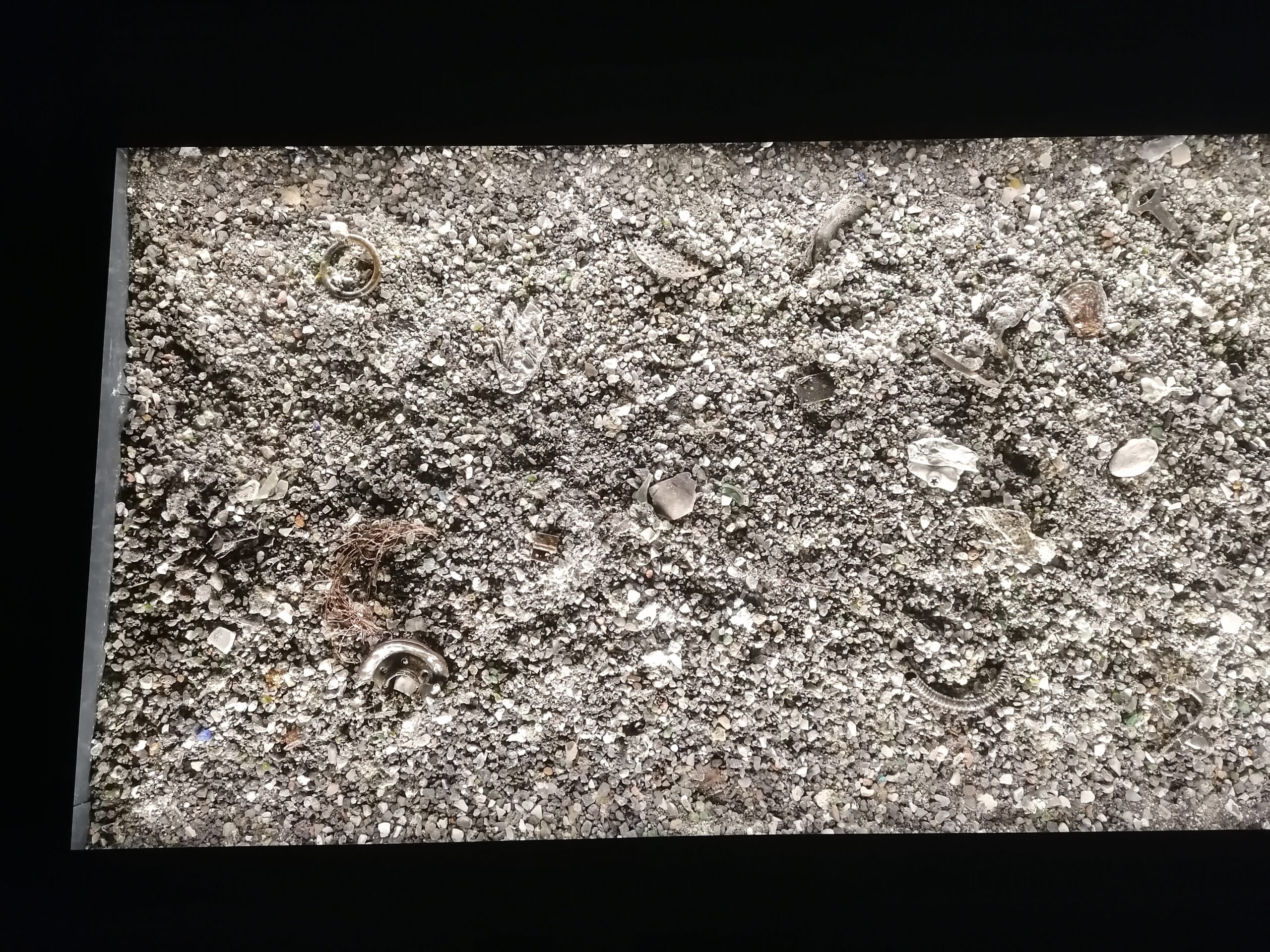It is the speculative affirmation that things might be otherwise but will be otherwise only if we learn to cultivate the art of being affected by what we learn to listen to, and of thinking with – not about – what affects us. (Isabelle Stengers in an interview with Jensen and Thorsen, 2019: 18)
It is dark as we step into the room. With a soft click, Mrs Camoreggio (name changed), our tour guide through a waste-to-energy plant in Switzerland, switches on the lighting, indirectly illuminating the narrow corridor below, from where my students and I surge. Proudly, she presents us with what in technical jargon is called ‘slag’: a slimy substance that leaves the incinerator (at a temperature of more than 1,000 degrees) as a waste product in a process that converts garbage to district heating – a form of heat, by the way, that has become astonishingly desirable in times of climate change and skyrocketing gas prices. On its way, the slag gathers other materials that have proven incombustible. Then it cools down. Along with it cool potentially valuable materials, such as aluminium, copper, or zinc, which could not be decomposed by the fire.

Another soft click transforms the environment from one illuminated by a cool, clinical white light, to a pleasant pink glow. This immediately feels much more comfortable, and Mrs Camoreggio enthusiastically shows us the remaining aluminium, copper, and zinc, which now gracefully appear from the solidified slime by means of the black light. Suddenly, I have the feeling that I am listening to a success story, as Mrs Camoreggio explains to us how recent technological innovations, over the course of a few years, have made the extraction of these valuable materials possible. By adding toxic chemical substances, the materialisation process of the slag can be reversed. It becomes gooey again, enabling the materials’ subsequent removal. It sounds like a journey into the past, where time is outwitted. I am wondering how years of experience of working with and giving tours in the waste-to-energy plant as a female (in a male-dominated world) has affected the knowledge that is conveyed to us. Or, in other words: how does ordinary knowledge, in the form of experiences accompanied by emotions, correlate with ‘hard facts’, facts that are considered scientifically proven and preferably detached from anything like feelings or personal experiences?

Affect is often described as the set of pre-individual bodily forces that are connected to autonomic responses (White, 2017: 178), and as a form of indirect and non-reflective thinking that establishes spaces for “thought in action” (Thrift, 2007). Affect denotes “visceral forces beneath, alongside, or generally other than conscious knowing, vital forces insisting beyond emotion” (Seigworth and Gregg, 2010: 1; emphasis i.o.). It is a capacity “to act and be acted upon” and resides in an “in-between-ness” (Seigworth and Gregg, 2010: 1; emphasis i.o.). It is above all sticky – it is “what sticks, or what sustains or preserves the connection between ideas, value, and objects” (Ahmed, 2010: 29). The decisive aspect of affect is its omnipresence: it “hums with the background noise of obstinacies and promises, ruts and disorientations, intensities and resting points … [and] stretches across real and imaginary social fields and sediments, linking some kind of everything” (Stewart, 2010: 340). However, affect is often stigmatised as being of minor importance – especially when it comes to the creation of an otherwise knowledge that could contest the fixed rationalities upon which scientific knowledge production relies. But affect does not stand-alone. It continuously becomes with. As Sara Ahmed (2010: 30) precisely describes, affect comes with the “messiness of the experimental, the unfolding of bodies into worlds, and the drama of contingency, how we are touched by what we are near”.
[Leaky Emotions]
Given that it is in affect’s nature to permeate, it may be said that all knowledge, including scientific rationality, is always affected. What waste-knowledge is – and when it becomes – is very much dependent upon authority structures, power hierarchies, and sociocultural understandings of dirt and purity that are, in turn, connected to hegemonic dichotomies, such as nature–culture, woman–man, worthless–valuable (or, to cluster these: ‘nature = woman = emotion’ versus ‘culture = man = rationality/science’). At the same time, knowledge is always embedded and thus situated (Haraway, 1988), but the form that such knowledge takes is dependent on ontonormative forces that claim a prerogative of interpretation. Knowledge about waste thus becomes fixed in certain sociomaterial constellations. For instance, waste recycling programmes, waste reduction policies, and other regulations define what knowledge is and how it should be handled, and thus predetermine the relations within which ‘knowledge hangs’. Based on the presupposition that waste is mainly considered either toxic for living beings, biospheres, and the whole planet, or valuable for the extraction of profitable second-hand natural resources, Science and Technology Studies-related studies could demonstrate other relationships that waste and pollution undergo, enacting even fruitful encounters with multispecies (i.e. in marine plastispheres) as well as with humans (i.e.as in the reclamation of waste for survival and emancipation). However, attitudes to waste and pollution generally have an emotive element. This linkage makes knowledge apperceptive and useful for quotidian navigation. What do you imagine when you think of waste? It is a leaky, maybe disgusting, but certainly smelly material that probably comes to mind; maybe the thought of it sends shivers down your spine, makes your face contort or your eyes jump to the next section of this contribution. What probably does not come to mind at first is the clean plastic recyclate (pictured in Figure 3) that, in my experience, fills engineers with zestful enthusiasm.
Thus, knowledge about waste is always bound up with emotion. Yet, I would suggest that it is undesirable, unsustainable, and – waste being an affecting material per se – not at all feasible simply to brusquely dissect this linkage and to artificially exclude emotion from the epistemological production process. For example, the knowledge of how to deal with household rubbish is often associated with feelings of disgust – especially when it comes to organic waste – while the knowledge of how to avoid as much plastic as possible in everyday life, as with knowledge of technological ‘innovations’ in the recovery of valuable materials, can cause joy and euphoria. In this way, knowledge and power at once resonate in the kind of ordinary affects that Stewart (2007, 1) describes as “varied, surging capacities to affect and to be affected that give everyday life the quality of a continual motion of relations, scenes, contingencies, and emergences”. These emotions catch people in something that feels like something. It feels like something and, I would add, changes consciousness. As a knowing-with, consciousness always comes with a knowledge of being in the world, with and through affective settings and situations, providing ways to navigate through quotidian life worlds.

While Mrs Camoreggio explains the tedious technical processes of the waste-to-energy plant – with its grey walls, crusty furnaces, and plentiful safety signs – I have to think about how the knowledge she is transmitting is obviously characterised by her many years of experience in this field, experience that goes far beyond, or rather, that is interwoven with, ‘pure’ scientific knowledge. It seems to have become affective knowledge, that is, a learned practice or skill resulting from the interplay between knowledge, emotion, and bodily experience; it is knowledge that is not considered ‘proper’ and that resides in the in-between-ness, it is difficult to grasp and often cannot be explained, but it strongly influences the way one responds to something.
Affective knowledge is, on the one hand, hardly discernible and often neglected (especially within frameworks of ontonormative epistemologies that are aligned with heteronormative dichotomies of male–female and scientific knowledge–ordinary knowledge) in technoscientific fields. On the other hand, it is embodied. It becomes visible through the in-between-ness of how we navigate truths, social realities, and life in general.
This also reminds me very much of the urban recycling infrastructures e.g. in countries of the Global South, where the so-called ‘informal’ sector maintains the cleanliness of entire cities through the labour of bodies that rely on deep experience within the material, social networks of these urban environments (e.g., Fredericks, 2018; Nguyen, 2019; Stamatopoulou-Robbins, 2020; Doherty, 2021; Eitel, 2022a). Or as AbdouMaliq Simone (2019: 8) describes it, it is the “rhythm of endurance” that characterises those settings in which people know “how to move and think through various angles” (Simone, 2019: 8; see also Lancione and Simone, 2021), and which, as Itty Abraham (2022) puts it, (postcolonial) global technology studies need to consider. However sluggish an endeavour this may be, given the normativity of other forms of knowledge, it need to be taken into account in order to stop epistemic violences.
Knowledge may also be embodied indiscriminately, as through slow violence, that is, violence that harms bodies over an initially unforeseen time span and whose effects become visible only later (Davies, 2019; Nixon, 2013). An example might be the case of marginalised urban dwellers who have no choice other than to live close to dumping fields where toxic ashes and methane emissions harm humans and non-humans alike, both directly – from pollution on site – and indirectly through the acceleration of climate change. Here, the insight heavily inscribes itself into the body. This inscription comes to be through the processing of accumulated impressions and experiences of knowledge gained with regard to one’s own social status, which are elucidated by spatial distribution and exclusion from relevant knowledge. In this way, affect in part defines and determines embodied forms of knowledge, and is dependent on scale. For instance, in the case of one person who ‘breathes the crap’ because they work in the landfill, and another who ‘gets rid of the crap’ because they get to live in a clean city, one form of knowledge will be preferred or heard, depending on the distribution of power and degree of social inclusion, while the other will be excluded, or near excluded, from the discourse. A kind of biopolitics that proceeds transversally and in rhythmic pulse may shift techniques of oppression towards a governing-through from somewhere other than top-down government procedure.
[Sentiments as a Passage]
Seeing affective (waste) knowledge as something not bound to a person or a body in the physical sense but rather to technologies, such as waste regimes, reveals another political dimension of this discussion. Knowledge per se is always in need of a means of dissemination – something that transports it over seemingly disconnected fields of interest and areas of daily life. It is affect here, as what Seigworth and Gregg (2010: 1) describe as the “passage (and the duration of passage) of forces or intensities”, that transports knowledge. Whether it be rendered as something scientific, emotional, or other-than-conscious, affect conserves knowledge by wrapping it up in emotional layers that provide a landing ground for adjacent thoughts and emotions. In this way, affect as “force or forces of encounter” is situated in an “in-between-ness and resides as accumulative beside-ness” (Seigworth and Gregg, 2010: 2, emphasis i.o.). As affect accumulates, “becoming a palimpsest of force-encounters” (Seigworth and Gregg, 2010: 2) or “moral sentiments” (Fassin, 2012: 1), it fixes an actor’s (whether a body’s or a technology’s) belonging to the world as well as the world’s belonging to the actor.
The idea that technological innovations based on specific scientific knowledge are perceived to have almost supernatural power is not novel. Contemporary STS research has focused extensively on how ‘expertness’ has become a welcome legitimation for programmes and initiatives undertaken in accordance with the UN’s Sustainable Development Goals, for example, and in the name of ‘sustainability’ or ‘waste recycling’. In this way, the sustainability discourse, which complements the development discourse, has given rise to what Didier Fassin (2012: 1) aptly calls “moral sentiments”. These exist nebulously around technologies and policy programmes that are dedicated to ‘helping’ the survival of our planet, engendering good feelings in those who act “morally correct”.
Within the development discourse, moral fixes about the correct forms of waste recycling have been established over the course of many years (Eitel, 2022b). Manifested in ‘waste regimes’, accumulated affective knowledge has enabled the maintenance and distribution of irrefutable ‘proper’ technoscientific knowledge about how to deal with waste best that has developed alongside long-established ways of doing politics. Based on waste fantasies that envision a world in which universal recycling and disposal strategies are easily implemented everywhere and anytime (despite local diversity ‘on the ground’), knowledge and fuzzy sentiments alike are crucial players in the field (Eitel, 2022a). Waste regimes “consist of social institutions and conventions that not only determine what wastes are considered valuable but also regulate their production and distribution”, as Zsuzsa Gille (2007, 2012: 29) points out. Moreover, they are based on a complex concatenation of prevailing (waste) knowledge that has solidified the continuous production of ontonormative epistemologies through repetitive and self-referential practices of ‘standards’, both inside and outside science, namely: measurement and computation, legibility, peer proof, replicability, and traceability (Knox, 2020; McKittrick, 2021).

Through the contingent interplay of the relationship between scientific–expert knowledge and technological fixes and innovations that produces transversally situated and temporally widely ramified waste regimes, power merely shifts from nation states to the transnational level, evading any real redistribution. Such ‘new’ regimes of sovereignty are just as intertwined with the production of identities and with patriarchally influenced ways of governing that draw clear lines of inclusion and exclusion, of what should and should not be preserved, and of what is or is not a matter of life or death (e.g., Mehrabi, 2020). Or, in other words, they are making agential cuts – as Karen Barad (2007, 2015) would put it. Technoscientific practices in this sense form, shape, and conceptualise our world through knowledge. This knowledge is often not visible and yet it is key to many phenomena that affect the planet unequally, such as climate change. It affects incessantly.
While Mrs Camoreggio keeps explaining, I am thinking of how obvious it is that her knowledge is based on much more than ‘pure’ scientific knowledge. It is interwoven with affect. If sentiments are capable of guiding entire programmes and initiatives, as Fassin (2012) has demonstrated in the case of the development discourse, then how does the affective dimension apply to scientific knowledge and the architectures that keep it alive? As an organic technology that is also quite similar to the slag at the beginning, waste regimes seem to be stable and aloof. But ironically, they have much in common with the affectivity of accumulated emotions – that is, sentiments – on which they seem to rely, and which they toxically attempt to eliminate when it comes to ‘expert knowledge’ (understood as neutral, objective, and universal scientific knowledge that is representational and has nothing at all to do with affects).
[Affective Inversions through Feminist Speculations]
Feminist STS scholarship views scientific and technological practices and applications as intertwined and inseparable, and as productive of gendered relations of power that intersect with other power differentials and markers of identity. Gender and identity are, then, always a product of science and technology (Åsberg and Lykke, 2010). Studies undertaken from this feminist perspective also pay attention “to the ways in which the discursive and material aspects of sociotechnical relations and processes of materialization are inextricably intertwined” (Åsberg and Lykke, 2010: 299), something that Donna J. Haraway (1989) also calls “material-semiotic”. In these material-semiotic processes that bring forth bodies, identities, and knowledge, emotionality seems to have only a deferred place, shelved in spheres from which common scientific methods are unable to extract data.
The acknowledgement of affective knowledge ‘from the margins’ – knowledge that is neglected by ontonormative and prevailing epistemologies and intellectual principles, and is considered ‘unscientific’ or merely ‘emotional’ vis-à-vis ordinary knowledge – is crucial for a truly global STS. I suggest everting this knowledge in order to grasp affect as it oscillates from suppressed, neglected, or marginalised corners of knowledge production, where it finds no entry into prevailing forms of knowledge that affect the practices of regimes and systems. This means everting knowledge as that which always comes with specific worldviews, values, and identities, for instance by way of integrating marginalised worldviews, i.e. through speculative storytelling – or, if you like, figurations. I suggest that affective inversions investigate how knowledge and its systems are based on affect and vice versa. Accordingly, I draw on Susan Leigh Star’s and Geoffrey Bowker’s (1999) concept of ‘infrastructural inversion’, which denotes a research strategy to closely examine the mundane (the functioning of infrastructures) by turning everything upside down, bringing inner life to the outside. A strategy of affective inversion implies first that interventions in affective knowledge can turn to the outside what is and what is not inscribed and emphasised. Second, it implies the immersion of content through feminist speculations. By taking seriously the reality-constituting power of tropes and narratives, feminist speculations reclaim interpretative sovereignty over classifications, identities, (future) realities, and the production of affective knowledge.
In the form of a situated art of crafting the world, speculations aim to contest discursive fixes, knowledge framings, and hegemonic positions. This could be ‘SF’, as Haraway (2016: 2) defines it: “science fiction, speculative fabulation, string figures, speculative feminism, science fact, so far”. In this way, speculative feminism “gives its destabilizing power to the mostly proximate sense we may have of the possibility for things to be otherwise, what we may feel in the interstices of what presents itself as reality”, as Isabelle Stengers points out (Jensen and Thorsen, 2019: 14). As the sub-plenary session on ‘Techno-science-fictional futures: methods, forms, norms’ at the 2022 EASST conference has exemplarily demonstrated (Cozza et al., 2022), this call is already being answered by a growing number of STS-inspired scholars who base their speculative visions on ethnographic studies.
STS as a discipline1 is well equipped to undertake experiments and interventions in its own areas of epistemological production, to be affected by other ways of knowing (waste and recycling) in its critical examination of North–South divides (Abraham, 2022), and to overcome seemingly fixed binaries of the conceptual and the empirical (Jensen, 2014). The study of waste from a (feminist) STS perspective is crucial here to understand that toxicity and pollution (understood in a broad sense) are more than environmental exposures and problems, but that they also affect epistemologies, other-knowledge, and bodies in a toxic and eventually violent way. I am not suggesting that our knowledge is waste, but that the way it is built on, ramified, and enacted is highly toxic both within and outside academia. Ultimately, I think that such interventions may provide a chance to become affected by the unquantifiable and the ephemeral, through an assault of that which seems at once chaotic and impressive.
Focusing on what leaks out of scientific practices in the Global North, and what STS can learn from affective approaches, new knowledge regimes, and other local, indigenous, and black epistemologies, brings me to the following call: STS and technoscientific practices need to come out of their sluggish vortex of imagination about sovereign knowledge. This is inherent to many academic institutions and is lived, whether in the in-house disciplines or in development policy projects, by transferring knowledge unilaterally (= demystification of the imperative knowledge transfer) as well as by training ‘experts’ who are then supposed to drive development in the Global South according to our knowledge benchmarks (= decolonization of epistemic infrastructure). As knowledge is wielded through transnational and transversally situated regimes (such as waste regimes), it is crucial to understand decolonialisation as an endeavour to dispossess power, to demystify the imperative of knowledge transfer, and to decolonise epistemic infrastructures. This is an incomplete list. I end this essay by conveying emotions that my generation know all too well: hope that what is expressed will have an impact, and fear of criticism and exclusion once the text is ‘out there’. These are emotions that too often go unspoken. They are emotions that trigger how we accomplish research, what we think is waste-knowledge, and what we consider to be valueless and a waste of knowledge.
Bibliography
Abraham I (2022) Impermanence, hybridity, violence: Notes towards a Global Technology Studies. Science, Technology and Society. Epub ahead of print 26 June 2022. DOI: 10.1177/09717218221102596.
Ahmed S (2010) Happy objects. In: Gregg M and Seigworth GJ (eds) The Affect Theory Reader. Durham, NC: Duke University Press, pp. 29–51.
Åsberg C and Lykke N (2010) Feminist technoscience studies. European Journal of Women’s Studies 17(4): 299–305.
Barad K (2007) Meeting the Universe Halfway: Quantum Physics and the Entanglement of Matter and Meaning. Durham, NC: Duke University Press.
Barad K (2015) TransMaterialities: Trans*/Matter/Realities and queer political imaginings. GLQ: A Journal of Lesbian and Gay Studies 21(2–3): 387–422.
Bowker GC and Star SL (1999) Sorting Things Out: Classification and its Consequences. Cambridge, MA; London: The MIT Press.
Cozza M, Klimburg-Witjes N and Wyatt S (2022) First-ever poetry, flash fiction and short story competition… introducing the winners. EASST Review 42(2): 58–59.
Davies T (2019) Slow violence and toxic geographies: ‘Out of sight’ to whom? Environment and Planning C: Politics and Space 40(2): 409–427.
Doherty J (2021) Waste Worlds: Inhabiting Kampala’s Infrastructures of Disposability. Oakland, CA: University of California Press.Eitel K (2022a) Recycling Infrastructures in Cambodia: Circularity, Waste, and Urban Life in Phnom Penh. London/New York: Routledge.
Eitel, Kathrin (2022a). Recycling Infrastructures in Cambodia. Circularity, Waste, and Urban Life in Phnom Penh. London/New York: Routledge.
Eitel K (2022b) Reshuffling Responsibility: Waste, Environmental Justice and Urban Citizenship in Cambodia. Worldwide Waste: Journal of Interdisciplinary Studies 5(1): 1–13.
Fassin D (2012) Humanitarian Reason: A Moral History of the Present. Berkeley, CA: University of California Press.
Fredericks R (2018) Garbage Citizenship: Vital Infrastructures of Labor in Dakar, Senegal. Durham, NC: Duke University Press.
Gille Z (2007) From the Cult of Waste to the Trash Heap of History: The Politics of Waste in Socialist and Postsocialist Hungary. Bloomington, IN: Indiana University Press.
Gille Z (2012) From risk to waste: Global food waste regimes. The Sociological Review 60(2): 27–46.
Haraway DJ (1989) Primate Visions: Gender, Race, and Nature in the World of Modern Science. Hoboken: Taylor and Francis.
Haraway DJ (2016) Staying with the Trouble: Making Kin in the Chthulucene. Durham, NC: Duke University Press.
Jensen CB (2014) Continuous variations: The conceptual and the empirical in STS. Science, Technology, & Human Values 39(2): 192–213.
Jensen CB and Thorsen LM (2019) Reclaiming imagination: Speculative SF as an art of consequences. An interview with Isabelle Stengers. NatureCulture 5. Available at: www.natcult.net/interviews/reclaiming-imagination-speculative-sf-as-an-art-of-consequences/ (accessed 7 December 2022).
Knox H (2020) Thinking Like a Climate: Governing a City in Times of Environmental Change. Durham, NC: Duke University Press.
Lancione M and Simone A (2021) Dwelling in liminalities, thinking beyond inhabitation. Environment and Planning D: Society and Space 39(6): 969–975.
McKittrick K (2021) Dear Science and Other Stories. Durham, NC: Duke University Press.
Mehrabi T (2020) Queer ecologies of death in the lab: Rethinking waste, decomposition and death through a queerfeminist lens. Australian Feminist Studies 35(104): 138–154.
Nguyen MTN (2018) Waste and Wealth: An Ethnography of Labor, Value, and Morality in a Vietnamese Recycling Economy. New York, NY; Oxford: Oxford University Press.
Nixon R (2013) Slow Violence and the Environmentalism of the Poor. Cambridge, MA: Harvard University Press.
Seigworth GJ and Gregg M (2010) An inventory of shimmers. In: Gregg M and Seigworth GJ (eds) The Affect Theory Reader. Durham, NC: Duke University Press, pp. 1–25.
Simone A (2019) Improvised Lives: Rhythms of Endurance in an Urban South. Cambridge; Medford, MA: Polity Press.
Stamatopoulou-Robbins S (2020) Waste Siege: The Life of Infrastructure in Palestine. Stanford, CA: Stanford University Press.
Stewart K (2007) Ordinary Affects. Durham, NC: Duke University Press.
Stewart K (2010) Worlding refrains. In: Gregg M and Seigworth GJ (eds) The Affect Theory Reader. Durham, NC: Duke University Press, pp. 339–353.
Thrift NJ (2007) Non-Representational Theory: Space, Politics, Affect. London; New York, NY: Routledge.
White D (2017) Affect: An Introduction. Cultural Anthropology 32(2): 175–80. https://doi.org/10.14506/ca32.2.01.